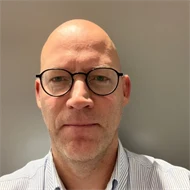Jimmy Jaldemark
Jimmy Jaldemark is an associate professor in pedagogy affiliated with HEEL and CER - Center for Research on Economic Relationships. His research has a significant focus on digitization and educational processes.
Tell us about Jimmy Jaldemark.
Since the late 1990s, I have been living in Härnösand and working at Mittuniversitetet since 1997. I moved here from Småland initially on a part-time basis but ended up staying in this beautiful part of Sweden. I studied to become a teacher at Jönköping University and worked there for a few years on various self-initiated development projects, which later evolved in a collaboration with the then Mitthögskolan. We created internet-based educational resources and support for teachers, something that was very innovative in 1995. Once I moved to Härnösand, I was hooked.
Describe your research.
Throughout my career as a researcher and academic, I have been interested in understanding how learning is influenced by the ongoing and transformative digitization. I have studied this in various educational contexts, including children and youth education, but my main focus has been on higher education and how learning in the workplace is affected by digitization.
In 2010, I defended my doctoral thesis in pedagogy titled "Participation in a boundless activity: Computer-mediated communication in Swedish higher education." In that study, I examined how learning and computer-mediated communication, such as social media, occur in university education. In recent years, I have increasingly focused on how lifelong learning can be combined with digital resources and technologies, also known as technology-enhanced learning. Within this field, I lead projects that combine both development and research. One of these projects is the BUFFL project, which is part of CER's activities. In this project, we develop a pedagogical model for short flexible competence development courses. The model is based on lifelong learning and the opportunities offered by digitization, aiming to support the development of individuals and organizations.
What sparked your interest in this field?
For many years, I have been interested in learning, which was initially the reason why I wanted to become a teacher. In the early 1990s, I noticed that digitization was increasingly affecting educational activities and processes. Since then, I have been completely captivated by this research area.
Why is your research needed?
Learning is central to every person's life. It is impossible to avoid learning, whether it involves acquiring good or bad things. Learning itself is neither negative nor positive as it is something that happens in every person's life. What becomes interesting to study are the conditions for learning. What do these conditions look like today and in the future? These conditions are influenced by individual aspects related to a person's upbringing and life situation, as well as societal conditions and processes of change. The latter are essential for understanding how society develops and changes.
Today, knowledge is emphasized more than ever before in history, and high-quality education is therefore important for the development and future opportunities of individuals, organizations, and geographic regions. In an increasingly digitized society, it is impossible to understand learning without considering the conditions provided by digitization. More knowledge is needed in a field that is constantly changing.
How do you allocate your time between research and teaching?
In recent years, I have not had much opportunity to teach in undergraduate programs. I am involved in too many development and research projects to contribute significantly there. My teaching is primarily focused on courses in the master's program in pedagogy. I am also involved in supervising many doctoral students and as one of the founders of GRADE (https://graderesearch.umu.se/), a national research school in digitization and education. Therefore, a significant amount of time is dedicated to doctoral education.
I am also engaged in collegial work, such as being a teaching representative in the Faculty Board of Humanities, which is a very interesting role that involves the governance of the faculty's resources and activities. Research tasks are squeezed in between all other work, and I find it very enjoyable to collaborate with colleagues, especially in interdisciplinary settings where new insights emerge at the boundaries of different disciplines. This is evident in the field of digitization and learning. One of the most exciting collaborations I am currently involved in is BUFFL, where I work with business economists and computer scientists. I also believe it is important as a researcher to be involved in the international development within my field. Therefore, I strive to publish my research extensively in international journals, conferences, and anthologies. I also serve as an editor and reviewer for international scientific journals.
Dream scenario in terms of the job?
I feel and have long felt that I am in the right place in my professional life. Being a researcher is an exciting job, and I think it's the best job in the world. Looking ahead, I see a continued strong development of our research in technology-enhanced lifelong learning. It is exciting and very interesting to contribute more knowledge about how learning in the workplace can be combined with participation in formal education at the university level. If we gain better knowledge in this area, we can contribute to human development.
Contact

